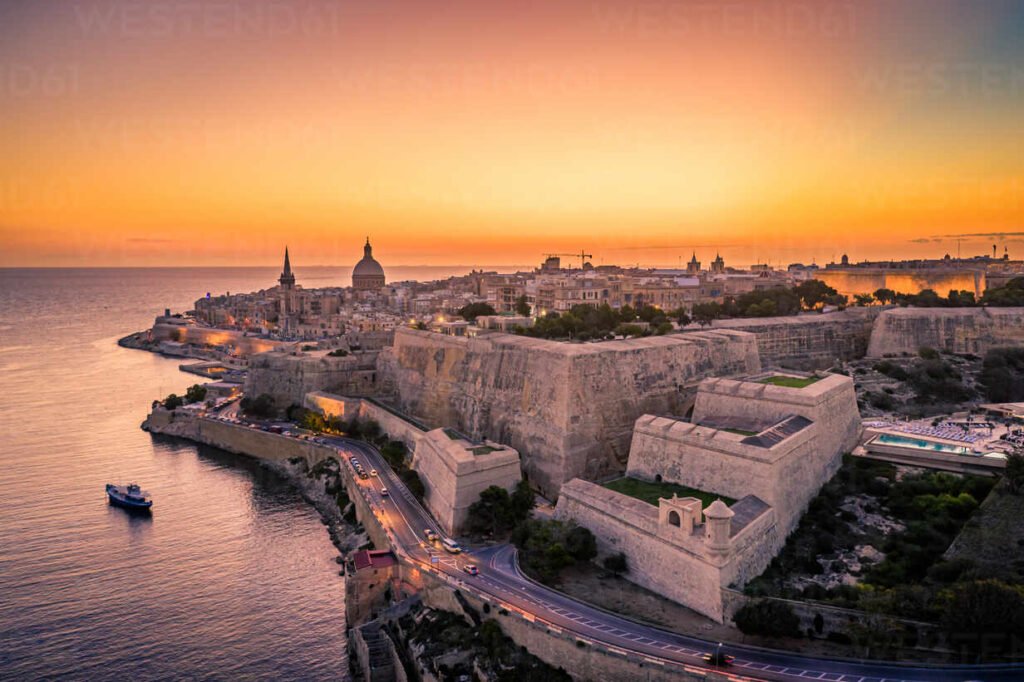MALTA


MALTA (EUPROPE)
"Shape Your Future with a maLTA Education"
Choosing Malta for your higher studies from Nepal is a decision that opens doors to a world of academic and personal growth. Malta, an island at the crossroads of Europe, offers a unique study experience that blends rich history, modern education, and a vibrant international community.
Known for its prestigious universities and colleges, Malta has become an attractive destination for students worldwide. With a reputation for offering high-quality education in a wide range of fields, including arts, science, business, and technology, Malta ensures that your degree is recognized globally.
The island’s student-friendly environment, affordable living costs, and a blend of Mediterranean culture make it a perfect place to pursue your studies. Cities like Valletta, Sliema, and St. Julian’s offer a dynamic student life with easy access to both academic and cultural experiences. Malta’s proximity to other European countries also adds an exciting opportunity for travel and exploration.
With Supra Education by your side, embark on a transformative academic journey in Malta—where exceptional education meets cultural richness and opportunity!

Why Study in the MALTA?
Studying in Malta offers a unique blend of high-quality education, cultural experiences, and a Mediterranean lifestyle that is perfect for international students. Here are some compelling reasons why Malta is a top choice for higher education:
- High-Quality Education: Malta is home to internationally recognized universities and institutions offering a wide range of programs in various fields such as business, engineering, arts, and medicine. Degrees from Maltese institutions are recognized across Europe and globally.
- Affordable Living: Compared to other European countries, Malta offers affordable tuition fees and lower living costs. Students can experience a high standard of living while staying within a reasonable budget.
- Multicultural Environment: Malta attracts students from all over the world, creating a vibrant and diverse international student community. This allows you to expand your horizons, meet people from different cultures, and form lifelong connections.
- English as the Primary Language of Instruction: English is one of Malta’s official languages and is widely spoken throughout the country. This makes it easier for international students to adapt to their academic and social environment.
- European Union Member: Malta is an EU member country, offering students the advantage of traveling freely within the Schengen Area and access to a wider range of opportunities across Europe.
- Beautiful Location: Malta is a stunning island with rich history, beautiful landscapes, and a mild Mediterranean climate. The country offers a perfect balance of academic excellence and leisure, with opportunities for outdoor activities, cultural exploration, and relaxation.
- Safe and Welcoming Environment: Malta is one of the safest countries in Europe with low crime rates, making it an ideal destination for students looking for a secure environment to live and study.
- Post-Graduation Opportunities: Malta’s growing economy, particularly in sectors like tourism, finance, and technology, offers excellent job prospects for graduates. The country’s strong connections with Europe create additional employment opportunities for international students.
Studying in Malta is an opportunity to receive world-class education while immersing yourself in a vibrant, multicultural environment, all within the beautiful Mediterranean setting.
Your Path to Studying in the malta
How Does Malta's Education System Benefit International Students?
Understanding the education system of Malta is essential for international students planning to pursue higher studies in this Mediterranean gem. The Maltese education system follows a British-style model, offering high-quality academic programs across multiple levels, with a focus on higher education for international students. Malta is home to both public and private institutions, including the well-regarded University of Malta, which offers a variety of undergraduate, postgraduate, and vocational courses.
Undergraduate programs typically last three years, with some degree courses such as medicine and architecture requiring longer durations. Postgraduate programs in Malta are usually completed in one or two years, providing students with both time-efficient and cost-effective learning. The country also offers foundation programs for students who need extra support before pursuing their degrees.
Malta’s universities are known for their diverse range of programs, particularly in fields like business, arts, engineering, technology, and healthcare. The education system emphasizes independent learning, critical thinking, and research, with a blend of lectures, tutorials, and practical learning experiences. Tuition fees are generally lower than those in many other European countries, making Malta a financially viable option for students seeking quality education abroad.
Malta follows an intake system similar to other European countries, with two main intakes: October and February. It’s recommended that students apply at least a few months ahead of their chosen intake. While courses are primarily taught in English, students may need to prove their English language proficiency through tests like IELTS or TOEFL. If English language skills are not up to the required level, universities provide preparatory courses to help students improve.
After completing their studies, international students in Malta can explore career opportunities in a growing job market, particularly in sectors like gaming, finance, IT, tourism, and education. Malta also offers various work-study opportunities, allowing students to gain valuable international work experience during their stay.
With its attractive location, lower cost of living, rich history, and access to the wider European job market, Malta provides international students with a solid foundation for both personal and professional growth. Let Supra Education help you explore the many possibilities of studying in Malta, guiding you every step of the way to success!
- Internationally Recognized Degrees
- English-Taught Programs
- Affordable Education:
- Cultural and Historical Experience:
- Safe and Student-Friendly Environment:
Pre-Bachelor’s Level:
Includes Certificate and Diploma programs, typically ranging from 1 to 3 years in duration.
Bachelor’s Level:
A full-time undergraduate program usually completed in 3 years.
Master’s Level:
Advanced graduate programs generally taking 1 to 2 years to complete.
Post-Graduate Diplomas:
Doctoral and research-focused programs lasting from 3 to 5 years.
PhD or Research Programs:
Doctoral studies or research-focused programs typically lasting 3 to 4 years.
Financial Planning for International Students in Malta
Financial planning is essential for international students considering studying in Malta. Compared to other European countries, Malta offers relatively affordable tuition fees and living costs, making it an attractive option for students. However, like any study abroad destination, students must account for both tuition fees and other living expenses, including accommodation, food, transportation, and healthcare.
Tuition Fees
Undergraduate tuition fees in Malta generally range between €6,000 and €12,000 per year, depending on the university and the specific course. Postgraduate tuition fees can vary, with most programs costing between €8,000 and €15,000 annually. The cost of tuition can differ between public and private institutions, with public universities offering lower fees for EU and international students. Students must demonstrate the financial capacity to cover their tuition and living costs when applying for a student visa.
Living Expenses
Students in Malta are required to show sufficient funds to cover their living expenses as part of their student visa application. The average living cost is between €800 and €1,200 per month, depending on lifestyle and accommodation choices. Accommodation options include university dorms, private apartments, and shared flats. University dorms tend to cost around €350 to €500 per month, while private rentals can range from €600 to €900 per month.
Additional Costs
Health Insurance: International students must have health insurance while studying in Malta. EU students can use their European Health Insurance Card (EHIC), while non-EU students will need to secure private health insurance. The cost typically ranges from €100 to €150 per year.
Visa Fees: Students from non-EU countries must apply for a student visa, with application fees typically around €60 to €80. It’s important to check for updates from the Maltese consulate.
Transportation: Malta offers a reliable public transportation system with buses connecting the island’s key areas. A monthly bus pass for students typically costs around €26, which is an affordable option for getting around.
While studying in Malta offers an excellent quality of education, international students can benefit from its relatively low living costs, affordable tuition, and numerous scholarships and work opportunities. Proper financial planning, including budgeting for accommodation, food, and other expenses, can ensure a smooth and rewarding study experience in this beautiful Mediterranean country.
Key Facts About Studying in the MALTA
- Intakes: February, October (Major Intakes), June (For Selective Courses)
- Number of Students: 1,500+ international students
- Listed Universities: 14 recognized institutions
- Average Tuition Fee: €7,000 – €15,000 per year (Undergraduate) | €8,000 – €18,000 per year (Postgraduate)
- Average Cost of Living: €8,000 – €12,000 per year
- Health Coverage: Yes, international students must have health insurance during their stay.
Frequently Asked Questions (FAQs)

Q: Is Malta a Schengen country?
Yes, Malta is part of the Schengen Area, allowing students to travel freely within most European countries.
Q: What is the cost of living in Malta for international students?
- The average cost of living in Malta is around €800 to €1,200 per month, depending on lifestyle and accommodation.
Q: What are the main intake months for universities in Malta?
The main intakes for universities in Malta are in October and February.
Q:Do I need a visa to study in Malta?
Yes, non-EU international students need to apply for a student visa to study in Malta.

